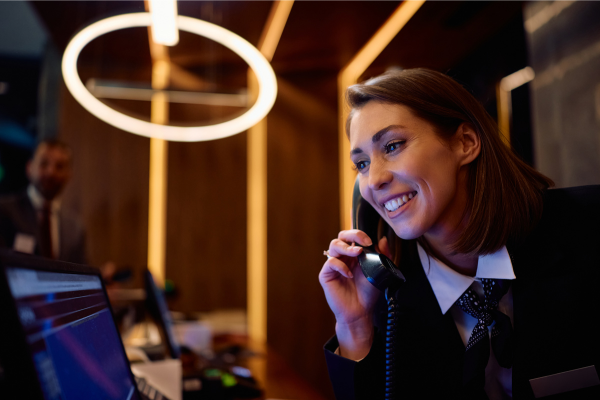How To Boost Hotel Sales with Social Media
How To Boost Hotel Sales with Social Media
When I talk with hoteliers about their social media efforts, most say that they are using the channel to find powerful ways to engage with their guests. They are treating their social media marketing like a cocktail party and listening to their guests first, before speaking. Through this engagement, they are able to deliver more personalized service that in turn helps deepen customer loyalty and brand advocacy. This fortuitous cycle inherently gives customers a greater willingness to spend and helps increase ancillary hotel revenue. Yet, when I ask these same savvy hoteliers how they are using social to drive sales directly, many will report far less success.
Why is this the case? Well, it starts with your hotel’s social media approach. As I discussed on a recent Revinate webinar focused on social media strategy, there are no blanket objectives or tactics to utilize across all social channels. Rather, each social network should be treated uniquely, as each has strengths and weaknesses that you, as marketers, should consider. It’s important to know which channels are best for customer communication and brand exposure and which are better for search engine optimization, driving traffic to your website and direct selling. This infographic from CMO.com and Adobe is helpful at breaking down these four social media priorities and can guide you when creating a strategic social plan.
Nevertheless, generating more leads and increase sales require an exhaustive approach that considers all of the ways your customer will interact with your hotel prior to booking. Here are some ideas that will help you along this process:
Aim to Inspire
Bain & Company reported that customers who interact with companies over social media spend between 20-40% more money with those companies than other customers. These customers didn’t spend more because they were bombarded with sales-oriented posts, but rather were inclined to because they were engaged by the brand. Think about a traveler’s path-to-purchase when planning a leisure trip. He/she may eventually end up on an OTA, meta-search or online review community like TripAdvisor to make the actual booking, but may use a social platform as an initial starting point. The inspiration phase of the purchase decision is the first opportunity to sell to the customer, albeit in an unobtrusive Freasoway that balances engagement and marketing.

Inspiring your customer through social, however, doesn’t end at this initial phase. As customers move closer to booking, your social media efforts should educate guests about how to get the most out of their stay and, in turn, influence them to spend more. By offering valuable information about your destination, you will give travelers a reason to stay engaged with you and will help drive loyalty.
Prospect Proactively
Many Revinate customers effectively use social media searches, a feature in our platform, as a way to proactively prospect for new business. Social media listening makes a sales impact when your hotel goes beyond reacting to Twitter mentions and Facebook comments and also looks for opportunities to engage with potential guests who are researching leisure travel plans through social. I often see my friends asking their networks for hotel recommendations when visiting particular cities and we have many clients that have won group business by listening and responding to posts. Finally, LinkedIn has become an ideal platform for sales managers to prospect new business and build stronger relationships with current customers. The channel is highly effective at providing new exposure to your business in a professionals-oriented environment that is sales-focused by nature.
Set Up Tracking
The biggest challenge with selling through social media is that calculating ROI is a complex and often daunting task. As mentioned above, studies have shown that social media is impactful during the inspiration phase of the travel purchase path, but often doesn’t lead to a direct booking. After a consumer is exposed to an offer through social media, he/she will visit your website to explore but will likely visit other sites before booking. Unfortunately, your website’s analytics reporting tool – whether you are using Google Analytics, Omniture, or a different platform – will focus on last-click attribution when calculating social ROI. (Don’t think this is true. GA shows you the whole funnel now.) Last-click attribution is problematic when trying to tie hard dollars to social media as the practice attributes the booking conversion with the last thing a visitor clicks on before entering your website. With last-click attribution, that different channel – whether it is organic search, TripAdvisor or a direct visit – will get the booking credit, not social media.
By diligently setting up tracking codes that measures other important metrics related to e-commerce, such as unique page views, time spent on site, bounce rate as well as first-click attribution, you can capture strong analytics. Your search marketing vendor will play a big role in this set-up process. Moreover, we see many revenue managers continuing to find conversion success by setting up unique rate codes for social media bookings, which is a direct way to capture social ROI.
Traffic Leads to Sales
Driving direct traffic is a great area to focus on when developing social campaigns. The great thing about using social to drive traffic to your website is that it doesn’t require altering your content strategy or messaging. If you do too much self promotion or include links to your website in posts just for the sake of it, you will lose audience engagement. However, by continuing to share relevant, interesting content with your fan base, you will entice them to visit your website more frequently, as your brand will be top-of-mind. Moreover, social is a great way to drive visitors to unique areas of your site that may not receive as much visibility as you would like. Hotels that frequently link to blog posts and other social content that lives on their websites do this effectively. By taking this approach, you will maintain your audience engagement as well as grow website traffic.
The Bottom Line
The bottom line is that social media can be an effective vehicle to drive sales. The 2013 Social Media Examiner Industry report, which surveyed more than 3,000 marketers across multiple industries, shows that more than half of marketers who have been using social media for at least three years report improved sales as a result, and more than 78% of participants found that increased traffic occurred with as little as 6 hours per week invested in social media marketing. By following the tips above and by continuing to showcase your property in a personal and authentic way, you will capture more potential bookings and your current fan base will likely spend more.
Want to drive more direct revenue and connect with guests? Download our free Email Marketing Strategy Guide. Never before has there been a more jam-packed, industry-specific guide to help hoteliers master the art (and science) of email marketing. Over 40+ topics with actionable insights, strategies, and best practices for email marketing.
Related Posts
This site is protected by reCAPTCHA and the Google Privacy Policy and Terms of Service apply. View our Terms & Conditions here. *Required fields.



